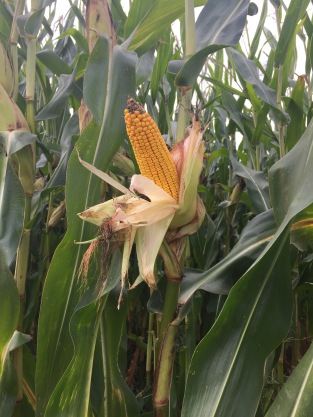As organic crop and dairy farmers, one of the most common questions we are asked about organic farming is this: “How do you grow corn? I’ve heard/read that organic corn is really difficult to grow organically – it gets over run with weeds and because chemical fertilizer isn’t an option, it only yields half of what could be grown conventionally.”
Here’s our answer to that…
As we’ve shared in the past (here and here), organic farming revolves around practices that increase soil health. Whether it be cover cropping, using manure or compost for fertilizing, or rotational cropping, organic farming requirements all have one over-arching goal: growing and maintaining healthy soil. Let’s take two of our corn fields as an example.
Field number 1, here at the home farm, has been farmed organically for 5 years now. It started out as pasture, had cow and chicken manure applied multiple times per year, and last summer was rotated into corn. We planted a triticale cover crop last fall, harvested it in the spring, spread chicken manure, plowed under the residue and seeded it in corn for one last season before it will be rotated back to grass. We also have irrigation here at the farm and irrigated the corn three times this summer. This field yielded 29-30 tons/acre of corn silage, the highest we’ve ever recorded on our farm. (Incidentally, the custom harvesting crew was very favourably impressed, stating that this corn was better than the majority of what they had harvested in our area so far this year. )

Field number 2 is part of a new long term lease that we acquired in the spring of 2016. It too is in its second year of corn and previously was a hazelnut orchard. No manure had been applied for more than two decades. Soil testing showed nearly no organic matter present. Last year, we applied chicken and dairy manure before seeding the corn. A hot dry summer with no irrigation presented a pretty dismal picture last fall: only 13 tons per acre of corn silage. A very very poor return on investment of time and money (land rent & seed).
But we weren’t giving up.
We know that organic farming isn’t about quick fixes, it’s about long term gains.
A conventional farmer would probably have added fertilizer with the corn seed and perhaps side-dressed with a specifically tailored chemical fertilizer later in the growing season. It would likely have resulted in a better crop yield. But it would have fed just the plant and not addressed the underlying problem of poor soil health. Our approach has been to utilize a winter cover crop, applying more manure this spring, and plowing under the cover crop residue before seeding. Just that one year of adding organic inputs has worked wonders! With more organic matter decomposing and breaking down in the soil, the corn crop had more “food” throughout the growing season. The added organic matter also helped the soil to retain moisture even though rain was pretty much non-existent again this summer. The result? With very similar & equally unfavourable weather conditions, a 65% increase in yield! This section will now be rotated into a grass/alfalfa mix for the next six years before our rotation brings corn back to this piece. Can you imagine how much better still that crop will be after years of building up that organic matter? It’s such an exciting prospect.

I guess the point is this: organic farming done well can definitely hold its own in “competition” with conventional farming when comparing yields. We may have different methods of achieving those yields, and organic farming often precludes the use of “quick fixes”, but based on this and other examples, it should be apparent that generalizations that organic farming = decreased crop yields are neither warranted nor accurate. Additionally, I believe that so many of the organic principles have amazing benefits for the land that we’ll leave behind to future generations. I’m certain of this: while organic farming may not be for everyone, it certainly is a good fit for our family and farm!
Any questions? Feel free to ask.



